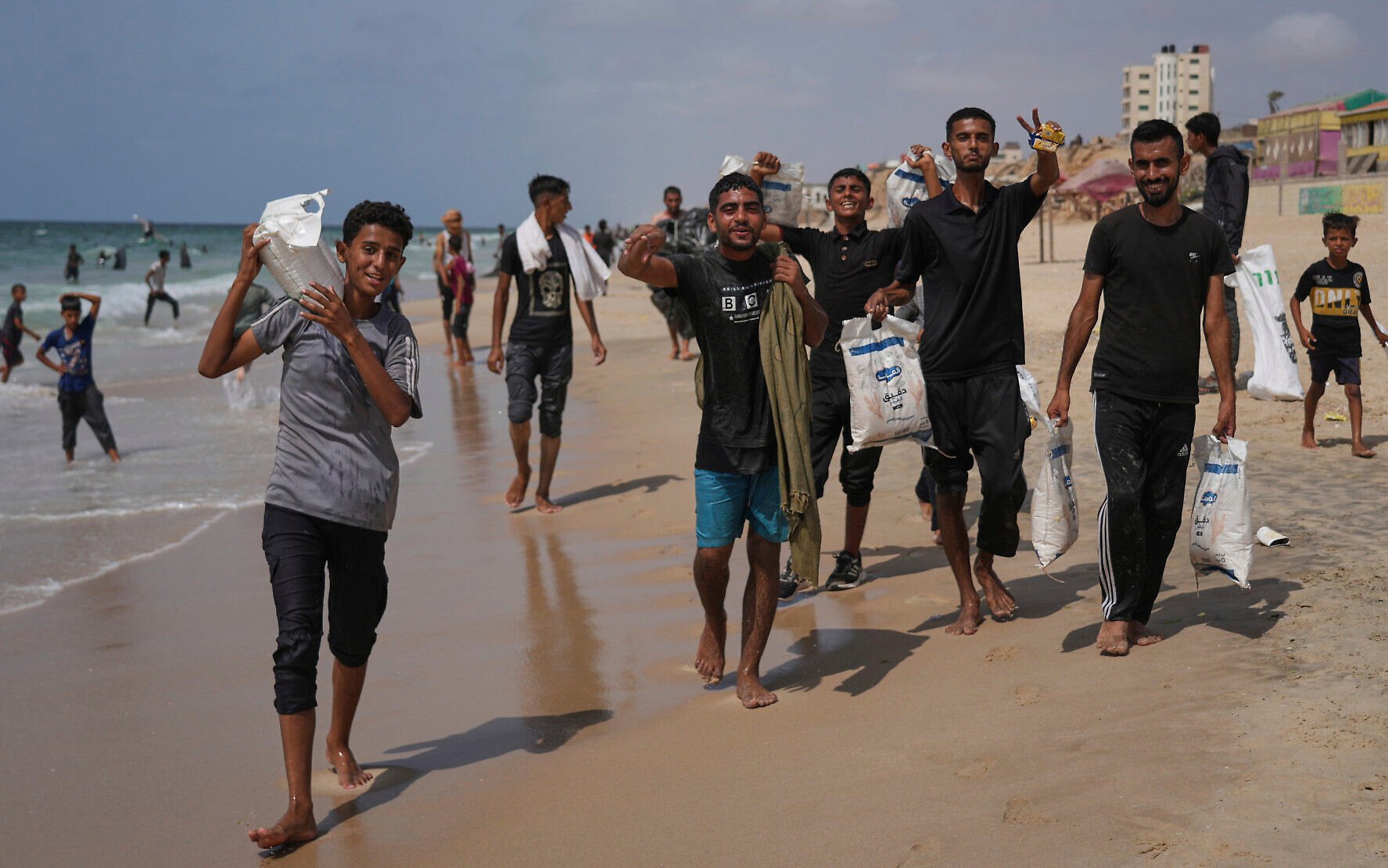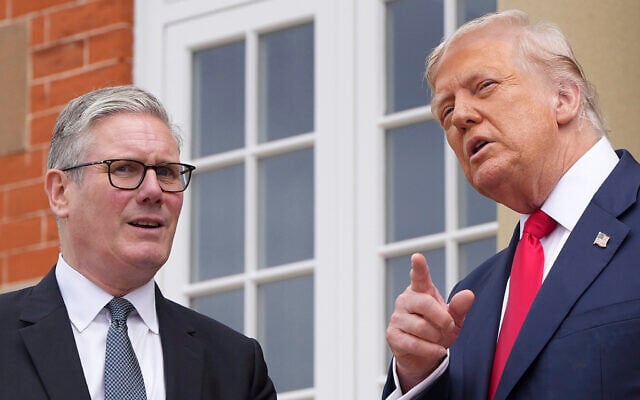



This Editor’s Note was sent out earlier Wednesday in ToI’s weekly update email to members of the Times of Israel Community. To receive these Editor’s Notes as they’re released, join the ToI Community here.
In the early months of Israel’s war against Hamas, various Israeli officials raised all manner of ideas regarding boosting humanitarian assistance to Gaza, even as the IDF moved slowly through the Strip to tackle Hamas’s 24-battalion army.
Among those proposals were for Israel to encourage multiple nations to deploy floating hospitals off the Gaza coast, and perhaps even for Israeli vessels to participate. France and the UAE actually did position floating hospitals nearby and treated Gaza patients. Another idea was for cruise ships to anchor near the Strip to serve as a temporary refuge from the fighting for Gaza’s elderly and infirm. That didn’t happen. Nor did an idea for Israel to airdrop aid packages across Gaza that would also carry photographs of the hostages, with rewards promised for information on their whereabouts.
Instead, Israel argued with itself about how much aid to supply, and with the UN about the mechanisms for distribution and the means to keep it out of Hamas’s hands. Much more recently, it halted supplies altogether for 11 weeks starting in March in an attempt to turn up pressure on Hamas for the release of further hostages, which Hamas was and remains unprepared to do unless Israel commits to ending the war.
Israel grudgingly lifted that ban in May when the US- and Israel-backed Gaza Humanitarian Foundation began operating — a presumably well-intentioned operation that has seen hundreds of Gazans reportedly killed when seeking to access the supplies, many of them apparently by the IDF amid near-daily scenes of chaos.
Until this week, when Israel agreed to a much-increased supply of aid amid soaring international criticism of the humanitarian situation in Gaza, heightened by reports of dozens of deaths from starvation and pictures of emaciated children, the quantity of aid entering Gaza was far below the levels that had been maintained until March. Now, US President Donald Trump, Israel’s most robust ally, is promising a US role in expanding the aid supply, having declared on Monday, “We can save a lot of people. I mean, some of those kids are — that’s real starvation stuff, I see it. You can’t fake that. So we’re going to be even more involved.”
As with aid, so too with the overall prosecution of the war. The Israeli government’s position has been high on rhetoric — Prime Minister Benjamin Netanyahu claimed last September that Israel was “a step away from victory” and Defense Minister Israel Katz every few days threatens to “open the gates of hell” on Hamas if it does not release more hostages — and absent on strategy. Hamas’s military capabilities have been radically degraded, but it has been able to continue to recruit, and it has been spared the one threat it most fears: the establishment of an alternative governance for Gaza that would supersede it.
Netanyahu has been steadfastly unwilling to legitimize any role for the Mahmoud Abbas-led Palestinian Authority, which he insists shares the Israel-eliminating goals of Hamas, just with a world-fooling veneer of ostensible willingness to coexist, and which was brusquely shoved out of Gaza in a matter of days by Hamas in 2007.
But there are really only three “day after” options for Gaza: the unthinkable return to unchallenged power by a revived Hamas intractably bent on destroying Israel; full-scale Israeli occupation for the foreseeable future; and an international governance mechanism, with an American role in oversight and participation by regional players. That third option, however, depends on an ostensibly legitimate Palestinian governance component — the Palestinian Authority — because otherwise, the other regional and global participants would be perceived as illegitimate overlords.
Far-right party leaders Bezalel Smotrich and Itamar Ben Gvir, without whom Netanyahu has no coalition, have long, openly sought the second of those options. Amid multiple unsourced reports this week that the government is weighing the full occupation of Gaza (where the IDF says it currently controls 75% of the territory) and mulling at least partial annexation, too, Smotrich on Tuesday declared that Gaza is “an inseparable part of Israel” and demanded the large-scale resettlement of the Strip (from which Israel unilaterally evicted its 7,000-8,000 settlers 20 years ago). He acknowledged being mocked and ridiculed for staying in the government even as it stepped up the influx of aid, when he had repeatedly vowed to bolt the coalition if that happened, but explained ominously: “Apparently I have reason to believe that good things are going to happen.”
With the IDF under unprecedented strain after almost 22 months of war, and Netanyahu doing everything in his power — including ousting the head of the Knesset’s Foreign Affairs and Defense Committee — to ensure that the tens of thousands of army-eligible ultra-Orthodox young men are not compelled to serve, it is entirely unclear how the army would maintain the occupation of the entire Gaza Strip and secure a revived settlement enterprise there. Doubtless Ben Gvir, the recidivist thug running the police, and Smotrich, the Jewish supremacist granted a ministerial role in the Defense Ministry by Netanyahu, have some ideas in mind. (Not incidentally, the Knesset voted overwhelmingly last week in favor of a non-binding motion to annex the West Bank.)
Israel’s regional and international allies, by contrast, have consistently urged Israel to work with them to implement option three — an international mechanism for Gaza’s governance, including a closely overseen PA, with no role for Hamas. At a UN gathering on Tuesday, Arab and Muslim countries condemned the Hamas invasion and massacre in an unprecedented joint declaration and called on Hamas to lay down its arms and free all the hostages, as part of a call to end the war in Gaza and progress to a two-state solution to the Israeli-Palestinian conflict.
As things stand, the Netanyahu-led government is floundering militarily in Gaza and alienating the world, and much of Israel and world Jewry, with its approach to Gaza’s noncombatants — their food, their well-being, their future. Netanyahu half-heartedly dissociates himself from far-right ministers such as Amichay Eliyahu who call to “wipe out” Gaza, but he keeps them in office. He does not confront the Smotrich and Ben Gvir calls for revived Jewish settlement and annexation of Gaza; indeed, he may be inclining to go along with them. He continues to embrace Trump’s February plan to compel all Gazans to leave, even as Trump no longer advocates it.
All of Israel’s self-perceived allies have been publicly horrified by the evidence of malnutrition in Gaza, and by the near-daily deaths of noncombatants seeking food. All of them are pressing for an urgent end to the war in Gaza. And almost all of them are now chorusing their support for a Palestinian state, a prospect opposed by Israelis far beyond Netanyahu’s base, and never more so than since the October 7 Hamas-led massacre — a monstrous attack launched against Israel from territory where Israel had no presence or claim, aimed at initiating the destruction of Israel.
Israel’s leveraging of aid to try to pressure Hamas, and the pictures and clips coming out of Gaza that have convinced even Trump that starvation is real, have in the past few days helped bring Israel’s international standing to a new low — truly a pariah state at this point, with its government simply not trusted by even close allies to maintain humane policies in its conduct of the war, and Israelis and the Jewish world anguished, torn and increasingly critical.
Hamas started the war almost 22 months ago with an unprovoked invasion in which it massacred primarily civilians with monstrous brutality, abducted 251 hostages and still holds 50, turned Gaza into a terror state, cynically abuses its populace as human shields and propaganda pawns — but Israel is now regarded as the prime villain. The damage is generational.
Only Trump has yet to throw his weight behind the Palestinian state advocates, notably now including two more Security Council permanent members in Britain and France. And even he said indulgently on Tuesday that the likes of Keir Starmer and Emmanuel Macron have the right to their opinion: “That’s okay. It doesn’t mean I have to agree.”
But Trump is now promising that the US will step in to help boost Gaza aid. And he has emphatically been demanding an urgent end to the war.
It’s far past time for Netanyahu — inconsistent on Gaza aid, back and forth on the terms of hostage-ceasefire deal — to make up his mind.
Will the prime minister belatedly adopt the least bad of the lousy options for ending the war — a deal to get back every single hostage possible, and a readiness to establish a US-led international and regional mechanism for building a non-threatening Gaza, at the price of a closely overseen role for the deeply problematic PA, but no role for a disarmed, superseded Hamas. Such a step would also reduce the global diplomatic and potential economic pressure for Palestinian statehood on terms that would reward Hamas and threaten Israel anew.
Or, already hobbling Israel’s judiciary and democratic character, is he bent on initiating an untenable, unsustainable long-term occupation of Gaza, which will deepen Israel’s isolation and turn it into an expanded state with a dwindling Jewish component — the complete failure of the Jewish-democratic Zionist vision?



